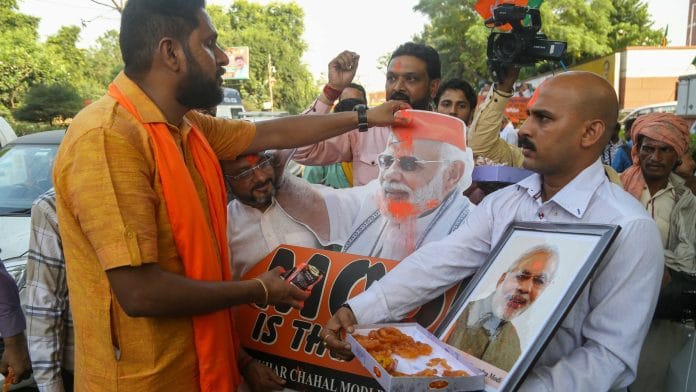For those who were politically naïve enough to believe the exit polls, the Haryana Assembly election results have come as a surprise. The Congress, shocked by the outcome, has resorted to questioning the Electronic Voting Machines, or EVMs, which it did not doubt when it got 99 seats in the Lok Sabha. The secret behind the BJP’s stunning victory in Haryana lies in its micro-management of every constituency and the massive door-to-door campaign conducted by lakhs of party workers. The Jammu and Kashmir elections were different and more complex, where the BJP is the second-largest party. Both the Congress and the People’s Democratic Party of the Mufti clan have posted a poor show.
The BJP has three reasons to feel content, if not necessarily overjoyed, with its victory in Haryana and the results in J&K. First is the realisation of its core agenda: redeeming its promise of abrogating Article 370, which it did on 5 August 2019. Contrary to apprehensions of unrest in J&K, the law and order situation has remained under control. The best part was the return to normalcy and a drastic fall in terror incidents, resulting in a revival of local businesses. The state, which had received just Rs 14,000 crore in investments since Independence, has attracted investment proposals worth about Rs 81,000 crore following the abrogation of Article 370.
The second reason for the BJP’s elation is the chaos within the People’s Alliance for Gupkar Declaration (PAGD) coalition, which unceremoniously asked the Congress to leave for not supporting the restoration of Article 370 in the run-up to the 2024 Lok Sabha election. In the assembly polls, the Congress fielded a total of 32 candidates. The National Conference (NC), led by Farooq Abdullah, contested 51 seats under a pre-poll alliance between the two INDI Alliance bloc parties and won 42, while the Congress managed only six.
Thirdly, soon after the polls, NC leader Omar Abdullah stated that the NC would have won more seats without the Congress’ support or coalition. He reposed confidence in Prime Minister Narendra Modi, whom he described as “an honourable man,” and he remained hopeful of getting statehood for J&K as promised by Home Minister Amit Shah in 2019. Given that no combination can give a stable government in J&K, the BJP might choose to remain the main opposition. Finally, with the NC leader not harping on the restoration of Article 370 anytime soon, the party is confident that its government can get support from the BJP-led Centre for J&K.
BJP’s battle is now with regional parties
It is a sort of pyrrhic victory for the Congress in J&K where it will be an unwanted guest in the ruling setup. If it chooses to stay out, it will have no role to play. But if Omar Abdullah dons the mantle of chief ministership, he would be prudent to keep the Congress close for its nuisance value. If shunned, the Congress can abstain from voting in a show of strength in the Assembly, causing embarrassment to the NC government.
Meanwhile, the knives are out for the Congress within the INDI Alliance. Madhya Pradesh Congress leader Kamal Nath’s “Akhilesh Wakhilesh” (we don’t care for SP) jibe and the Samajwadi Party’s decision to field candidates for all seats in Uttar Pradesh have come back to haunt the Congress after its defeat in Haryana. It is not surprising that the Samajwadi Party has announced its candidates for all six Assembly bypolls without consulting or including its ally, the Congress. Eventually, the SP may quit the INDI Alliance and take on the BJP independently, as its immediate rival, the Bahujan Samaj Party (BSP), is not in fighting shape.
In Delhi, the AAP, which forfeited deposit in all 87 seats out of 88 it contested in Haryana, has announced that it will not ally with the Congress for the ensuing state elections. In Maharashtra, during the recent Lok Sabha elections, the Congress won 13 of the 30 seats secured by the INDI Alliance bloc, while the Shiv Sena (UBT) and the Nationalist Congress Party (NCP) won nine and eight seats, respectively. This success has emboldened the Congress to demand more seats in the coming Assembly elections. The tussle within the Maha Vikas Aghadi (MVA) alliance over seat allocations for the Maharashtra Assembly polls has reportedly intensified, with the Congress and Shiv Sena (UBT) both laying claim to six minority-dominated constituencies in Mumbai and other seats in the state.
In the 2019 Assembly polls, then-united Shiv Sena (now the Uddhav Thackeray-led Shiv Sena (UBT)) was in alliance with the BJP and contested in 124 seats, winning 56. This time, as part of the MVA, it may get less than 100 seats to contest. Why would it want to share power with a Congress that could come a cropper in Maharashtra?
Yet, for the BJP, a defeated Congress alone cannot guarantee victory in other states. The BJP’s win in Haryana must consider the fact that it overcame anti-incumbency to trounce the Congress, but seven of its nine cabinet ministers lost their seats. A weakened Congress with ineffective leadership has ceded political space to regional parties in the states. The BJP must prepare to counter these regional parties. Coalition politics and the spirit of federalism will likely continue to coexist in Indian politics for some time to come.
The author is the former editor of ‘Organiser’. He tweets @seshadrichari. Views are personal.
(Edited by Prashant)






